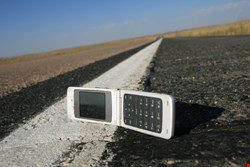
The survey by YouGov – and sponsored by SecurEnvoy – took in responses from almost 2,000 mobile phone users, and found that men would notice their phones had gone much quicker than women (40% male vs 29% female users would notice within 15 minutes) says the report.
Interestingly, the two-factor tokenless authentication specialist says there was a marked difference between age groups, with younger mobile phone owners being far more likely to notice their phone had gone missing sooner.
Twenty-eight percent of users in the 18–24 age range said they would notice their mobile going walkabout within five minutes of losing it, a time-span that tends to fall through the age groups – to just 13% in the 55-plus age range.
Commenting on the statistics, Steve Watts, the co-founder of SecurEnvoy, said they show that mobile phones have become part of the national psyche, with people carrying them around in much the same way as they carry their wallets and purses.
"The clear trend is that the younger a person is – and the more steeped in the digital culture they are – the more use and awareness they have of their mobile handset, resulting in mental alarm bells ringing if they find their prize possession missing, for whatever reason", he said.
"Our observations here at SecurEnvoy suggest that the volume of data carried on the modern mobile – which may also be a smartphone – in the form of contacts, text plus picture messages, and the 'life' of its owner, is steadily rising", he added.
Coupled with the fact that a growing number of people are using their mobile handsets for everything from paying for their car parking, authenticating their computers and carrying out mobile internet plus voice-driven electronic banking, Watts says it is clear that people love their mobiles and value them.
Against this backdrop, the SecurEnvoy co-founder adds that, as society continues down the path of the electronic revolution, and today's young teenagers become tomorrow's adults, this trend can only accelerate.
And with lower-cost smartphones from Google Android smartphone vendors already available, and the promise of budget versions of the iPhone coming down the technology turnpike, Watts predicts that mobile phones will increase in importance in our everyday lives.
"Mobile phones are now being used as multi-functional devices. The range of features on today's smartphones, driven by apps and other non-voice facilities, means that it won't be long before we start using the mobile phone for an ever-increasing range of services", he said.
"The time will come when we will open our cars, access our front doors and office premises, all using our mobiles. We are only just beginning to scratch the surface of multiple functions, largely owing to the immense flexibility that the modern cellular handset now offers people of all ages and classes," he added.